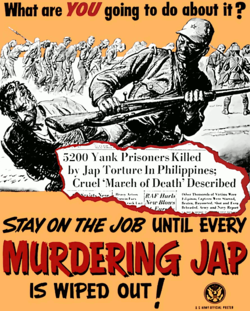- 29 Nov 2011 13:31
#13841122
The vast majority of people doesn't live in your country (and had absolutely no choice whatsoever in that), so yes, there is a contradiction and you do not care about (the vast majority) of people.
Rei Murasame wrote:Fascists care about their own people first, because they are nationalists, is what my point is. There is no contradiction there at all. The whole reason you are having this argument with me, is because I obviously care about people I regard as 'in-group and collaborators' more fervently than I care about out-groups.
The vast majority of people doesn't live in your country (and had absolutely no choice whatsoever in that), so yes, there is a contradiction and you do not care about (the vast majority) of people.
Don't make me use my stuff on ya, baby!









 No point in injecting your own derogatory comment into your argument. There was significant racism(on both sides) during the war. A large part of the reason that Allied soldiers were so woefully abused, was Japanese racism(33% of all American POWs died in Japanese hands, compared to 3.5% if captured by Germans.). Also, to correct your obvious mistake(while making your emotional/racist comment), Americans referred to Japanese as "nips", the shortened version of Nipponese, from the Japanese name for Japan, Nippon.
No point in injecting your own derogatory comment into your argument. There was significant racism(on both sides) during the war. A large part of the reason that Allied soldiers were so woefully abused, was Japanese racism(33% of all American POWs died in Japanese hands, compared to 3.5% if captured by Germans.). Also, to correct your obvious mistake(while making your emotional/racist comment), Americans referred to Japanese as "nips", the shortened version of Nipponese, from the Japanese name for Japan, Nippon.








 - By Fasces
- By Fasces - By wat0n
- By wat0n